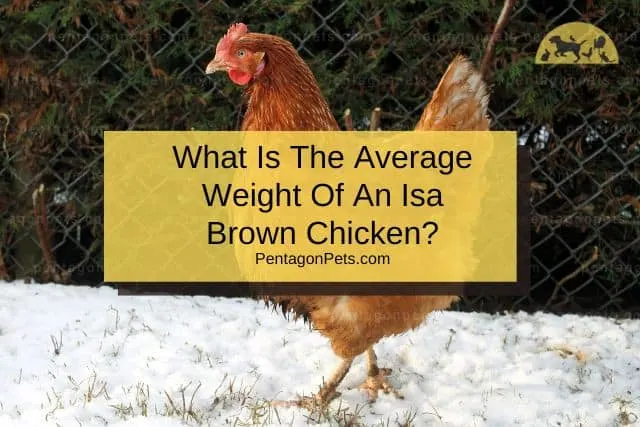Isa Browns are one of the easiest chicken breeds to raise. Not only are they friendly and affectionate, but they are also heavy layers and can lay almost one egg a day! Keep on reading to learn how to raise and care for Isa Brown chicken.
Caring for Isa Brown chickens involves providing them with a comfortable coop, a nutritious diet rich in proteins, regular health check-ups, and ensuring they have enough space to roam and exercise. They are known for their friendly nature and high egg production.

Raising Isa Browns is like nurturing a close-knit family; they thrive on interaction and care. These birds are sociable and enjoy human company, so spending time with them daily strengthens your bond and keeps them happy.
A spacious, predator-proof coop is essential for their safety and comfort, as they need ample room to stretch, roost, and lay eggs.
Incorporate a variety of grains, vegetables, and a high-quality layer feed into their diet to ensure they receive all the necessary nutrients for health and prolific egg laying.
Fresh water is crucial, especially during hot weather, to keep them hydrated and healthy.
However, it’s important to be vigilant about their health. Isa Browns are hardy, but like all chickens, they can be susceptible to parasites and common poultry diseases.
Regular health checks, a clean living environment, and preventive care, such as vaccinations, are vital.
Overcrowding can lead to stress and feather pecking, so ensure they have enough space. Think of their coop as a castle; it should be secure, spacious, and clean, with each hen having her throne—or in this case, nesting box—to lay her eggs.
This care and attention to detail will ensure your Isa Browns lead a happy, productive life, rewarding you with a bounty of eggs and companionship.
How Big Does An Isa Brown Chicken Grow?
How big a chicken breed gets will have a direct affect on the size of the coop and run, as well as how much feed is needed to keep them healthy and strong.
Isa Browns are considered medium sized birds, with roosters reaching heights of up to 16 inches. Hens are smaller in size and have an average height of between 10 to 14 inches. Unlike a lot of other popular breeds, the Isa Brown does not have a bantam type.
What Is The Average Weight Of An Isa Brown Chicken?

The Isa Brown chicken is a medium-sized bird that has a rectangular-shaped body with a bit of a dip at its back and its tail upright. It is mostly brown in color but can have some white feathers here and there.
Isa Brown roosters weigh in at about 6 pounds, and the hens can weigh as much as 5 pounds. While they can be raised for their meat, they are rather small birds and work better for their egg laying abilities instead.
The Isa Brown chicken breed does not have any bantam varieties available. So, if you’re looking for a chicken breed that offers bantam varieties, you will need to look elsewhere.
When Will An Isa Brown Chicken Start Laying Eggs?
If raising Isa Brown chickens for their eggs, you will want to know when you can expect your hens to start laying those delicious eggs.
Isa Brown chickens typically start laying eggs between 22 and 26 weeks of age. This breed is usually the go to for backyard farmers who want the most “bang for their buck”, since Isa Browns produce an abundance of eggs when compared with how much time, food, and money is needed to raise them.
Will An Isa Brown Chicken Lay White Or Brown Eggs?

Egg color can vary from one breed of chicken to the next. While white eggs are the ones most often seen in stores, they are far from the only color that chickens can produce. Let’s take a look at what color egg Isa Brown produces.
Isa Brown chickens lay large to extra large brown eggs. For some people, laying brown eggs can be a downside to this breed. The truth is, there are no discernible differences between white eggs and brown eggs, except for the color of the shells.
White eggs are often associated with grocery stores and commercial egg layers, while brown is often thought of as small farm and backyard flocks. But did you know that there are some chicken breeds that lay other colors of eggs? It’s true! The Easter Egger chicken, for example, can lay various colors of eggs, including blue, green, and pink. Olive Eggers are another breed of chicken that doesn’t produce white or brown eggs. They instead lay olive-colored eggs.
Do You Need A Same Breed Rooster To Get Isa Brown Chicken To Lay Eggs?
Unless you have experience raising chickens, you may not know whether the same breed of rooster is required to get the Isa Brown chickens to lay eggs.
Hens do not need a rooster to lay eggs, and will keep laying eggs even if you don’t have a rooster in your flock. If, however, you want to hatch your own eggs, you will need a rooster to fertilize the eggs. This rooster can be of any breed, and it is not uncommon for the rooster to mate with all the hens in your flock, no matter what their breed.
Just remember that if you want to raise your own chicks, the babies will be a combination of the hen’s breed and the rooster’s breed. So, if you want Isa Brown chicks, you will need an Isa Brown hen and a Isa Brown rooster.
What Is The Lifespan Of An Isa Brown Chicken?

The lifespan of the Isa Brown breed is a common question. Unfortunately, the answer is not a good one. Isa Browns have one of the shortest lifespans of all the chicken breeds.
Isa Brown chickens have a relatively short lifespan, and live for only about 2 to 4 years. This is a common life expectancy for chickens that are considered commercial layer breeds. To help increase this lifespan, make sure to provide your flock with the best care possible.
Are Isa Brown Chickens Friendly?
When deciding which breed of chicken to add to your flock, you should pay close attention to the temperament of each breed. This is extremely important if you have children in your home or are planning on placing your chicken coop and run in close proximity to your home.
Isa Browns are friendly chickens that are not aggressive. These docile birds are affectionate, which makes them a good choice for backyard flocks. They are even considered one of the most family friendly chicken breeds, which means you can raise them alongside your children.
Remember that even the most friendly chicken breed can still peek or “attack” if they are provoked or mistreated. That is why it is important to show children how to properly handle and respect all animals. This will help keep both your chickens and your children safe.
This article was first published on March 25, 2023 by Pentagon-Pets.
How Many Eggs Can An Isa Brown Chicken Lay A Day?

Eggs are the number one reason why people decide to start raising their own chickens. And with the cost of eggs skyrocketing, it is only natural that more and more people are interested in having their own flock. What you may not know, however, is that some chicken breeds lay more eggs a day than others. Knowing which ones lay the most may directly affect which breed you decide to raise.
Isa Browns are heavy layers who can lay between 300 and 350 eggs per year. This breed is considered one of the best egg layers. The downside is that this does reduce the lifespan of the bird. Isa Browns are also good mothers, which is important if you want your hens to raise their own chicks.
While laying that many eggs is usually a good thing, it does mean you may have to check for eggs at least twice a day, once in the morning and once in the evening.
When Will An Isa Brown Chicken Stop Laying Eggs?
One of the downsides of raising chickens is that they will eventually stop laying eggs, and every breed of hen has a different timeline for when this could occur.
Isa Browns are egg-laying machines, with the most eggs laid during the first 18 to 24 months. They will, however, start to reduce the amount of eggs laid as they age. While they can still continue to lay throughout their entire lifespan, it is drastically reduced after they reach 2 years of age.
The exact timeframe for when the Isa Brown hen will stop laying eggs can vary greatly from one bird to the next. There are also other issues that could interfere with the hen’s ability to lay that have nothing to do with its age, such as health complications and stress factors.
At What Age Is An Isa Brown Chicken The Most Delicious?

Isa Browns are dual-purpose chickens, which means they can be raised for both their eggs and their meat. But that doesn’t mean you can butcher the birds at anytime. If you want to have the most delicious meat, you will need to know the ideal age at when you harvest this bird.
The best time to harvest Isa Brown chickens for their meat is around 16 weeks of age. At this time, the meat is still tender and will taste the most delicious. While you can butcher the bird at a later age, the longer you wait the tougher the meat will get.
If you do butcher an older Isa Brown, consider cooking the meat slowly, such as in a crockpot or slow cooker, as this will soften the meat up a bit and make it more tender and tastier.
Best Housing Setup For An Isa Brown Chicken
No matter what breed of bird you decide to raise, you will need to determine what the best housing setup is for that specific breed. Remember, some breeds need more space than others and this should be concerned before building or purchasing the coop.
The best housing setup for Isa Brown chickens is a secured, draft-free coop that has plenty of nesting boxes. They need about 4 square feet of coop space per bird, and at least 8 square feet of run space per bird. Additionally, make sure they have at least 18 inches of perching space as well.
As always, you want to ensure that the coop is well protected from predators, which may mean burying wire mesh several inches around the coop and run to prevent digging predators from gaining access to your flock.
Typical Health Problems Of An Isa Brown Chicken

Knowing what typical health problems to expect will help you narrow down which chicken breeds you should add to your flock. Some breeds have little to no issues, while others experience serious and potentially life-threatening problems.
The most common health problems affecting the Isa Brown chicken are directly related to reproductive issues. This is because this breed was specifically bred to lay an abundance of eggs. Some of the most common issues include egg prolapses, cancer, and egg yolk peritonitis.
The good news is that these issues typically do not appear until the hen is at least 2 years old. The downside is that there is little you can do to prevent these health problems from occurring.
Pentagon Pet is the owner of this article that was first published on March 25, 2023.
Typical Problems Raising Isa Brown Chickens
While not all the typical problems associated with raising chickens have to do with their health, Isa Browns don’t have any other real issues except for those related to their health.
The most typical problems raising Isa Brown chickens have to do with the health issues caused by their ability to lay an abundance of eggs. Because of this, their reproductive systems do not get a rest and they are prone to cancers, tumors, and prolapses.
Unfortunately, there isn’t much you can do to prevent these issues since they are drastically related to the breed. You can, however, help to keep the Isa Brown chicken from developing any other problems by ensuring they have high quality feed, fresh water, a clean coop, and regular vaccinations.
What Type Of Food Is Best For Isa Brown Chickens?

The type of food you feed your flock will have a direct impact on their overall health, wellness, and happiness. That is why it is important to not skimp on the food.
The best food for Isa Brown chickens is a high-quality layer feed that helps promote healthy egg production. You should also supplement their diet with turnip greens, kale, lettuce, chard, broccoli, beets, pumpkins, cucumbers, carrots, blueberries, strawberries, and watermelon.
Additionally, allow your flock to forage as this not only gives them additional food options, such as grubs and seeds, but it also keeps them active and entertained, which is good for their mental health as well as their physical health.
Related Articles
How To Raise And Care For Leghorn Chicken
How To Raise And Care For Australorp Chicken
How To Raise And Care For Orpington Chickens
How To Raise And Care For Bovan Chickens
This article and its contents are owned by Pentagon Pets and was first published on March 25, 2023.
